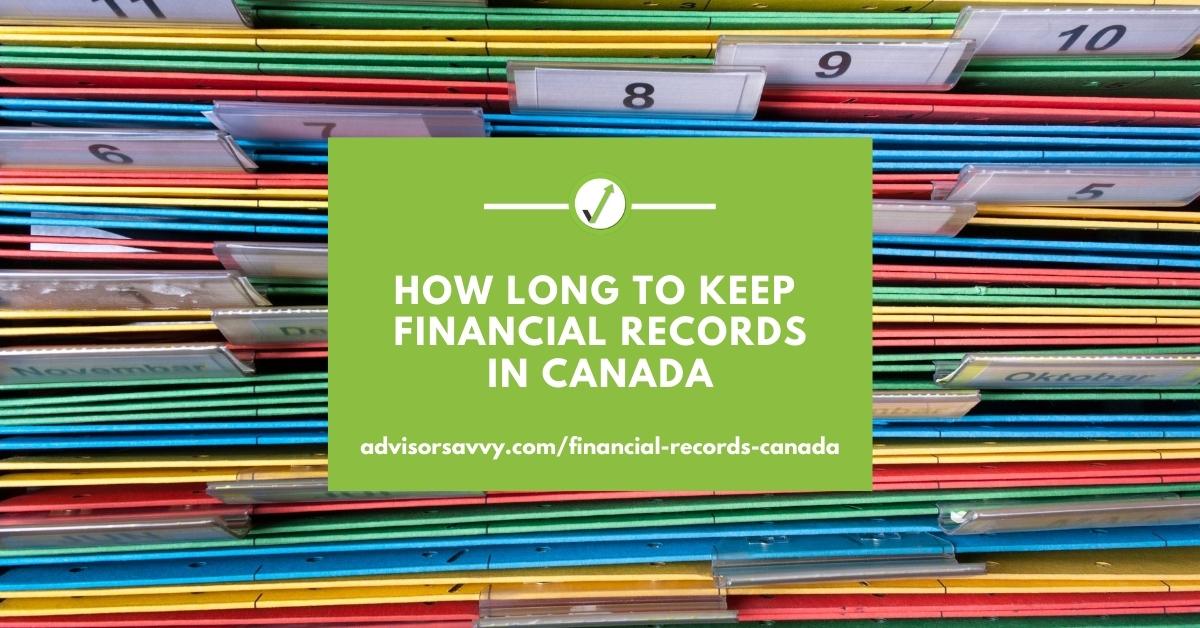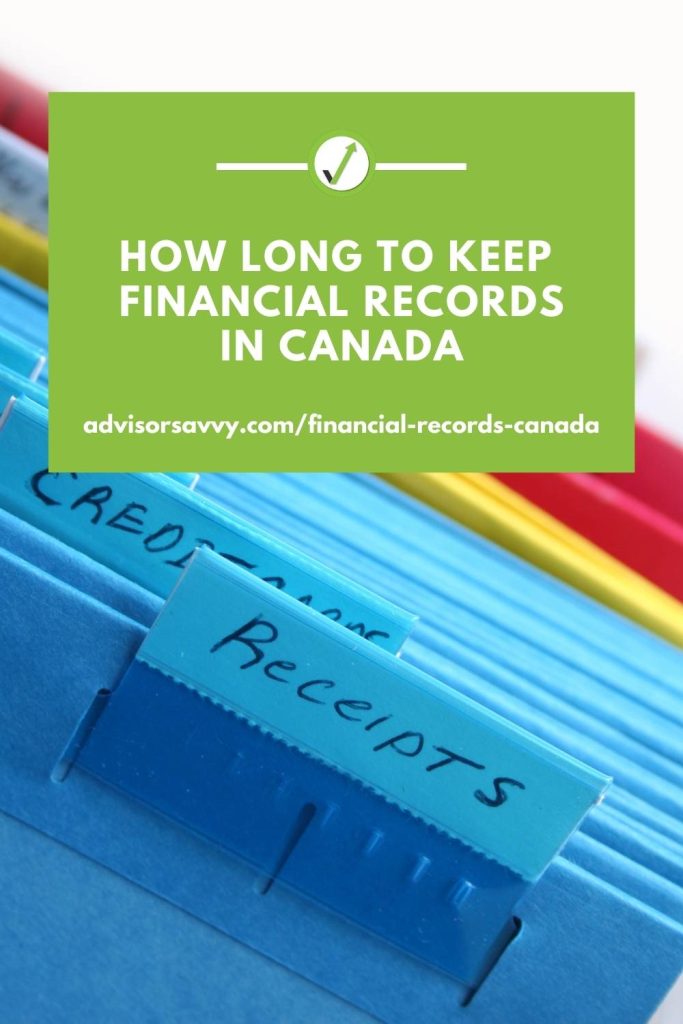
What do you do when you get a credit card statement? Take a quick look and either delete it or toss it in the recycling? What about when you’re ready to roll up to your accountant’s office. Do you have a few folders with neatly-stacked stapled receipts or a shoebox of wrinkled papers you had to scramble around to find in the first place? You might even have your own system worked out for your financial records, proudly declaring that there’s a ‘method to your madness.’

Table of contents
Whether you stick to paper records, have migrated to folders in the cloud, or use a hybrid system, there are guidelines for both what financial documents to keep and for how long. Get your paper stacks ready and plug in your shredder! Let’s look at how long you need to keep financial records, and what you can recycle.
One thing to keep in mind: If you’re a business owner, your guidelines might be a bit different, and dictated by law. We’re looking at personal financial documents here, so be sure to keep your business records separate, and consult your accountant for more specific guidance!
Why is it important to keep my financial documents?
For starters, keeping your financial documents in a safe, organized system will almost guarantee you’ll never get frustrated looking for an important document you need. It’ll also make tax preparation, budgeting, and investment planning easier. Need a copy of your marriage certificate or last year’s tax return? Boom — you’re set. I don’t know if you’ve ever had to tear your apartment or house apart looking for a single sheet of paper, but no one has ever been particularly excited to do so.
Also, think about your loved ones. If something happened to you suddenly, you’d want to make sure your documents are in good order, updated, and well, all in one place. Having to dig through piles isn’t ideal when you’re in crisis mode.
Now, one of the most important reasons to keep your financial records in good order? The Canada Revenue Agency (CRA). If they need supporting documentation to back up any claims you’re making on your taxes, you’re probably going to have an easier time if your documents are still around and well-organized. Ultimately, good recordkeeping means the process will be that much quicker.
How many years can the CRA go back to audit?
Did you start sweating a little when you read that headline?
The thought of an audit or reassessment can make anyone’s stomach do a little flip-flop. Luckily, there are limits to how far back the CRA can go.
The CRA has four years from the Notice of Assessment date to conduct an audit on a return. For example, your 2021 taxes will be assessed in approximately May or June 2022. Your audit window is open until May or June of 2026.
Related Reading: Guide To Tax Credits — How To Get A Bigger Tax Refund In 2022
What can trigger a CRA audit?
First off, there is a difference between a CRA review and an audit.
The agency does an initial review when you file your taxes. Once they do this, you’ll get a Notice of Assessment. Subsequently, the CRA can select your tax return for review. Reasons include:
- Information on your return does not match the information received from third-party sources, such as T4 slips
- Types of deductions or credits you claimed
- Compliance history
- Random selection
On the other hand, CRA audits are done based on risk assessment. Factors include likelihood or frequency of errors and non-compliance indicators. They may also compare your taxpayer information with similar files or with other audits.
For more on audits, head to the CRA’s website.
How long to keep financial records in Canada? A Checklist
Let’s deep dive into what you need to keep and for how long below. Having a checklist of items can really help you keep on top of things!
Tax records
You must keep income tax records for six years, per the CRA This is from the end of the tax year to which they apply. If you’re filing a return late, the six-year rule starts upon filing, not the tax year.
Tax returns, supporting documents like T-slips, and receipts/documents for medical expenses, child care, donations, moving expenses, work-from-home expenses, etc need to be kept in case of review. Basically, anything you claimed as a credit or deduction needs supporting documentation — even if you aren’t required to submit these when you originally file your return. You should also keep corresponding notices of assessment/reassessment, and receipts from when you pay taxes owing. Make sure you organize these by year and not document type!
Estate planning documents
Estate planning involves a lot of facets. First off, related to tax records, you should keep a deceased person’s returns and supporting documentation for the same six years.
Wills, trusts, a list of key contacts, and power of attorney documents need to be in a very secure place like a safe. Make sure family members know where this is and can access it. It might be instinctual to put these documents in a safety deposit box, but your loved ones will likely have a hard time (legally) accessing them if you’re deceased or incapacitated. It’s a good idea to keep copies in your safety deposit box, though.
Statements
Bank, brokerage, credit card, and mortgage statements can all be filed for a year and then shredded. If you get an annual statement (for example, for your mortgage or investments), cross-check with your monthly statements before you get rid of them.
Hang on to annual statements for six years.
Receipts
Unless it’s a receipt for an expense you’ll be putting on your taxes, you can keep it for about a month in your files until you’ve updated your budget. Make sure you cross-reference with your credit card statement or bank activity.
Bills
The good thing about most bills these days is that you can easily switch to paperless. In this case, you can set up either inbox folders to keep these organized or download and save them in the cloud.
Keep bills (utility, internet, phone) for a year, and then you can shred them. It’s helpful to compare bills from the previous year to monitor your rates.
Insurance documents
As long as your policy is active, keep these documents in a safe. If you get updated documents, replace them and shred the old ones.
Related Reading: Head to the insurance section on our blog for more
Warranties
Most are going to come with an expiry date, so already you’ve got a helpful guide for how long to keep a warranty. That said, if you get rid of the appliance before the warranty runs out, turf it.
It’s also important to keep the original purchase receipt. Take a photocopy or scan-and-store the receipt, just in case the ink fades.
Personal certificates, records, and documents
Birth/wedding/death certificates, divorce papers/agreements, military records, medical records, and adoption records go in a safe. DO NOT laminate any of these! Doing so voids them. Keep them in a sturdy envelope or a plastic sleeve. For easy access, keep colour copies in your secured filing cabinet.
It’s probably not surprising that these documents need to be kept indefinitely. For example, even if you are divorced, you might need the original marriage certificate at some point.
House/car/job-related documents
House documents: If you did renovations, keep the related documents (especially receipts) until you are no longer the owner. The same applies to real estate and mortgage records.
Car documents: Keep registration and ownership papers as long as you own your car. If car expenses are part of your taxes, keep related receipts with your tax documents.
Job documents: If you need to keep receipts for your employer, store them with job-related documents like employment contracts, benefits package details, insurance details, and pay stubs.
Keep the above as long as you have your job (unless you sign a new contract or your benefits/insurance changes). Pay stubs can be kept for a year so you can cross-reference with your T4 at tax time. The exception is pension papers. These should be kept indefinitely.
How do you organize and store financial documents?
As mentioned above, certain documents like birth/wedding/divorce certificates, estate documents, and house deeds should ideally go in a safe. You can also include passports and SIN cards in this group as well. Again, only keep copies in a safety deposit box. You can also include copies in your regular filing cabinet, in case you need a number or other piece of information quickly. It’s also a good idea to keep colour copies of your driver’s license, health card, and citizenship card or certificate.
For tax documents, receipts, bills, statements, and everything else we covered, a secure filing cabinet with proper labelling should do the trick. If you’re keeping it in a basement where flooding could be a concern, make sure it’s off the ground. Keep tax-related documents organized by year, and everything else can be organized by document type. Within each folder, it’s a good practice to organize chronologically.
If you’re going paperless for some or even all of your financial records, set up folders in the cloud (eg. Google Drive) similar to your paper folder organizational system. Alternatively, set up inbox folders to keep track of things like monthly bills.
Related Reading: What is Personal Finance and Why is it Important?
Takeaways
It all comes down to one word: preparedness.
Our finances often have an uncanny ability to wallop us with emotion and stress. Simply put, when you’re ready for anything from a CRA audit to an annual review of your finances to a mortgage application, you’ll feel that much better and in control. Even more, keeping on top of financial documents you no longer need and properly shredding them will keep your system in check. Finally, if something happens to you, you’ll know that your loved ones won’t have to sort through piles of unorganized documents when they’re dealing with a crisis or overwhelmed by grief.
Take the time to get organized and properly store your financial documents, keeping the above timelines in mind. You’ll be glad you did!
Your financial situation is unique, and we can help you find the best advisor for your needs. Just fill out our short questionnaire.
